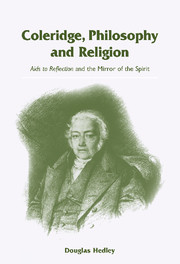Book contents
- Frontmatter
- Contents
- Acknowledgements
- List of abbreviations
- Notes on the text
- Prologue: explaining Coleridge's explanation
- 1 The true philosopher is the lover of God
- 2 Inner word: reflection as meditation
- 3 The image of God: reflection as imitating the divine spirit
- 4 God is truth: the faculty of reflection or human Understanding in relation to the divine Reason
- 5 The great instauration: reflection as the renewal of the soul
- 6 The vision of God: reflection culture, and the seed of a deiform nature
- Epilogue: the candle of the Lord and Coleridge's legacy
- Bibliography
- Index
Epilogue: the candle of the Lord and Coleridge's legacy
Published online by Cambridge University Press: 15 December 2009
- Frontmatter
- Contents
- Acknowledgements
- List of abbreviations
- Notes on the text
- Prologue: explaining Coleridge's explanation
- 1 The true philosopher is the lover of God
- 2 Inner word: reflection as meditation
- 3 The image of God: reflection as imitating the divine spirit
- 4 God is truth: the faculty of reflection or human Understanding in relation to the divine Reason
- 5 The great instauration: reflection as the renewal of the soul
- 6 The vision of God: reflection culture, and the seed of a deiform nature
- Epilogue: the candle of the Lord and Coleridge's legacy
- Bibliography
- Index
Summary
COLERIDGE AND ANGLO-SAXON VICTORIAN IDEALISM
I pity the man who can see the connection of his own ideas. Still more do I pity him, the connection of whose ideas any other person can see. Sir, the great evil is, that there is too much commonplace light in our moral and political literature; and light is an enemy to mystery, and mystery is a great friend to enthusiasm. Now the enthusiasm for abstract truth is an exceedingly fine thing, as long as the truth, which is the object of the enthusiasm, is so completely abstract as to be altogether out of the reach of human faculties; and, in that sense, I have myself an enthusiasm for truth, but in no other, for the pleasure of metaphysical investigation lies in the means, not in the end; and if the end could be found, the pleasure of the means would cease. The mind, to be kept in health, must be kept in exercise. The proper exercise of the mind is elaborate reasoning. Analytical reasoning is a base and mechanical process, which takes to pieces and examines, bit by bit, the rude material of knowledge, and extracts therefrom a few hard and obstinate things called facts, every thing in the shape of which I cordially hate. But synthetical reasoning, setting up as its goal some unattainable abstraction, like an imaginary quantity in algebra, and commencing its course with taking for granted some two assertions which cannot be proved, from the union of these two assumed truths produces a third assumption, and so on in infinite series, to the unspeakable benefit of the human intellect. […]
- Type
- Chapter
- Information
- Coleridge, Philosophy and ReligionAids to Reflection and the Mirror of the Spirit, pp. 286 - 300Publisher: Cambridge University PressPrint publication year: 2000



